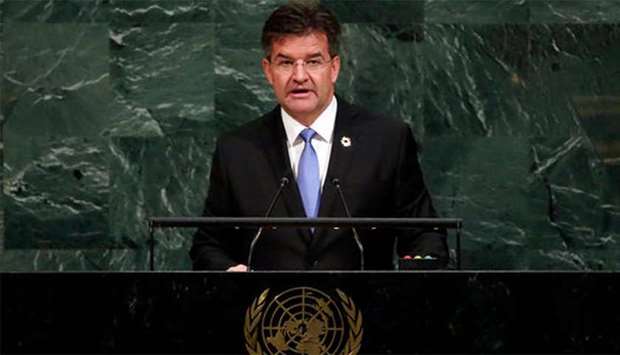The 72nd UN General Assembly meetings kicked off Tuesday in the presence of world leaders, heads of governments and ranking officials from the UN member states, to discuss issues of concern to countries and peoples around the world, most importantly are the maintenance of international peace and security, the prevention of armed conflicts, the Palestinian cause, the establishment of a nuclear-weapon-free zone in the Middle East and the strengthening of the role of mediation in the peaceful settlement of disputes.
Opening the annual general debate, President of the United Nations General Assembly Miroslav Lajcak stressed the need for more work on prevention, a greater focus on people, and keeping promises made to advance prosperity and protect the planet.
He said that civilians bear the brunt of war, noting that nearly 65 million people around the world have been forced to leave their homes, fleeing conflicts and wars.
Lajcak called on the international community to keep its promises to curb poverty and protect the environment by following through with commitments made in the 2030 Sustainable Development Agenda and the Paris Agreement on climate change.
He noted that the 193 members of the UN General Assembly will face one of its biggest test with the process of adopting the first Global Compact for Migration at a time when world leaders have varying opinions on the phenomenon.
Lack of accountability and follow through also potentially plague work to counter international terrorism, and following up on violations of international humanitarian law, he added.
"I see the priority clusters of 'peace and prevention,' 'people and planet and prosperity as three sides of a triangle. They might not all be the same length, or the same width, but one is as important as the other," he said.
For his part, UN Secretary-General Antonio Guterres spotlighted several threats, including the nuclear peril, climate change, and ongoing conflicts, that must be overcome to create a better world for all.
He said that the world is seeing insecurity rising, inequality growing, conflict spreading, climate changing, societies fragmenting and political discourse polarizing.
The UN chief noted that global anxieties about nuclear weapons are at the highest level since the end of the Cold War due to provocative nuclear and missile tests by the Democratic People's Republic of Korea.
"The solution must be political. This is a time for statesmanship. We must not sleepwalk our way into war," he warned, as fiery talk can lead to fatal misunderstandings".
On terrorism, the Secretary-General stressed the need to address the roots of radicalization. "It is not enough to fight terrorists on the battlefield," he said.
Stressing the need for "a surge in diplomacy today" and "a leap in conflict prevention for tomorrow," he said that it is possible to move from war to peace, and from dictatorship to democracy. Only political solutions can bring peace to the unresolved conflicts in Syria, Yemen, South Sudan, the Sahel, Afghanistan and elsewhere. That was why he announced the creation of a high-level advisory board on mediation, he added.
On Myanmar, Guterres said the Asian country's authorities must end the military operations in Rakhine state, allow unhindered humanitarian access, and address the grievances of the Rohingya Muslims, whose status has been left unresolved for far too long.
On the Israel-Palestine conflict, the two-state solution remains the only way forward, he said.
Turning to climate change, Guterres urged Governments to implement the historic Paris Agreement with greater ambition.
While explaining how globalization and technological advances have brought uneven benefits, he also highlighted the dark side of innovation, such as cybersecurity threats as well as the possible negative implications of artificial intelligence and genetic engineering.
Guterres said safe migration cannot be limited to the global elite and stressed the need to do more to face the challenges of migration. Refugees, internally displaced persons and migrants are not the problem; the problem lies in conflict, persecution and hopeless poverty.

